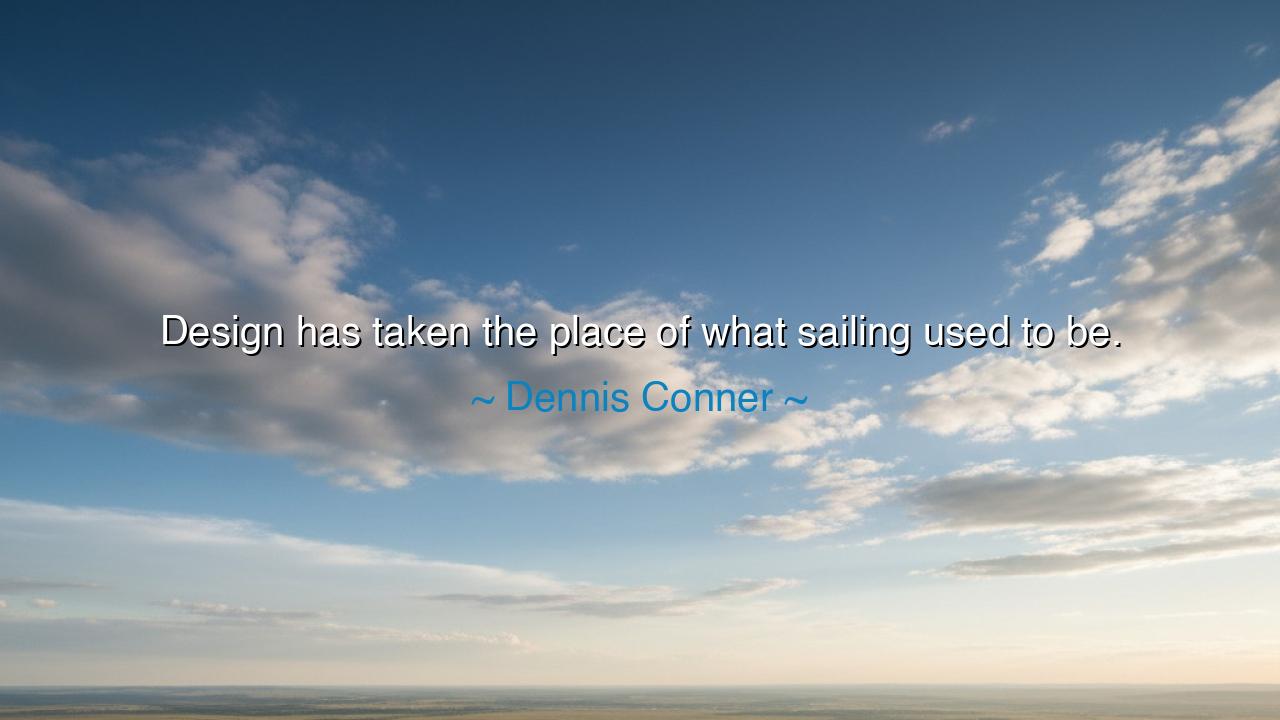
Design has taken the place of what sailing used to be.






In the words of Dennis Conner, the master of the sea and the relentless competitor of the America’s Cup, there lies a revelation about the changing nature of mastery and craft: “Design has taken the place of what sailing used to be.” In this statement, Conner speaks not only of ships and wind, but of the transformation of human endeavor itself. What was once an art of intuition, courage, and the raw dialogue between sailor and sea has become a contest of calculation and design — of minds crafting perfection through science rather than spirits wrestling with nature. He speaks with both awe and sorrow, for something has been gained, and something — perhaps nobler, more elemental — has been lost.
Once, sailing was the song of the adventurer. The mariner faced the vast unknown, guided only by stars and instinct. Each voyage was a communion between man and the living ocean, each decision a leap of faith. The ship was more than wood and sail — it was a living extension of the sailor’s soul. But as the centuries turned, and as intellect replaced instinct, the design of ships grew ever more refined. Mathematics conquered mystery. Steel replaced timber. Computers replaced compasses. The sailor became a strategist, and the sea — once a foe to be understood — became a formula to be solved.
Conner, who devoted his life to mastering both wind and wave, saw this transformation firsthand. When he first competed for the America’s Cup, it was still a duel of sailors — of men reading the horizon, sensing the wind’s invisible moods. Yet, as the years passed, the contest evolved. Victory no longer rested in the calloused hands of the crew, but in the silent genius of engineers. The shape of the hull, the tension of the mast, the precision of materials — design became destiny. The race was won not on the open sea, but long before, in the quiet halls of creation. Thus, what sailing once symbolized — the pure struggle between human courage and nature’s will — had been replaced by the mastery of man over his own invention.
This truth, though born in the harbor, ripples through all of modern life. Where once the warrior fought with sword and skill, now machines wage wars of code and signal. Where once the artist sculpted with the imperfect hand, now algorithms refine every curve. Humanity, once defined by its struggle with the unknown, now finds its glory in design — the art of controlling chaos before it even begins. Conner’s words are not a lament alone; they are a mirror held to our age. We have traded sweat for precision, risk for certainty, adventure for control.
And yet, in this exchange, a question arises: have we diminished ourselves, or merely evolved? When design replaces instinct, when perfection replaces passion, do we rise closer to the divine — or do we drift further from what made us human? The sailor of old listened to the whisper of waves; the designer listens to the hum of machines. Both seek harmony, but one through surrender, the other through command. In this balance lies the eternal tension of progress — the cost of mastery.
Consider the story of Leonardo da Vinci, the eternal designer. He built flying machines long before flight, imagined cities long before industry. Yet even he knew that invention without wonder is hollow. He spent hours studying the flow of water, the curve of a bird’s wing — not to conquer them, but to learn their grace. Like the sailors of Conner’s youth, Leonardo understood that true design is not domination, but dialogue — between maker and made, between dream and world.
Therefore, the lesson is this: embrace design, but do not forget sailing. Let your mastery serve your spirit, not silence it. Build your ships with the brilliance of your mind, but sail them with the courage of your heart. Remember that perfection without passion is motion without meaning. The ancients found joy in the wind’s unpredictability; so too must we find joy in the uncertain seas of our own creation.
So, children of the modern age, when you stand before your own designs — your buildings, your machines, your ambitions — remember the sea. Remember that progress is only noble when it honors the soul of what came before. For in every design, no matter how flawless, there must still echo the sound of the wind in the sails, the pulse of human daring, and the eternal call of the unknown.






AAdministratorAdministrator
Welcome, honored guests. Please leave a comment, we will respond soon